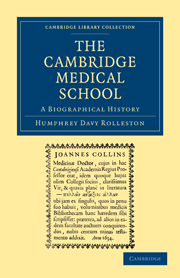Book contents
- Frontmatter
- Contents
- List of Plates
- Preface
- I The Medical School
- II Department of Anatomy
- III Department of Physiology
- IV Department of Biochemistry
- V Department of Experimental Psychology
- VI Department of Pathology
- VII Department of the Quick Chair of Biology
- VIII The Regius Chair of Physic
- IX John Caius
- X The Downing Chair of Medicine
- XI The Linacre Lectureship in Physic
- XII The Chair of Surgery
- Index of Persons
- Index of Subjects
- Plate section
VII - Department of the Quick Chair of Biology
Published online by Cambridge University Press: 07 September 2010
- Frontmatter
- Contents
- List of Plates
- Preface
- I The Medical School
- II Department of Anatomy
- III Department of Physiology
- IV Department of Biochemistry
- V Department of Experimental Psychology
- VI Department of Pathology
- VII Department of the Quick Chair of Biology
- VIII The Regius Chair of Physic
- IX John Caius
- X The Downing Chair of Medicine
- XI The Linacre Lectureship in Physic
- XII The Chair of Surgery
- Index of Persons
- Index of Subjects
- Plate section
Summary
THIS professorship was established by a Grace of May 10, 1906, which provided that the professor should devote himself to the study of the protozoa, especially such as cause disease; but in 1920, on the recommendation of the Managers of the Quick Fund, this definition of the professor's duty was broadened to the study of parasitology. By the will of Frederick James Quick (1836–1902), of Trinity Hall (B.A. 1859), a wholesale tea merchant much interested in biology and botany, funds were left for the stipend (£1000) of a professor and eventually for a sum not to exceed £300 for expenses and assistance. The professorial stipend was, like others, subsequently raised to £1200. The chair, which is tenable for three years, the holder being subject to reelection, was filled in 1906 by George Henry Falkiner Nuttall, who earlier in that year had been appointed to the Readership in Hygiene established by Grace of May 24, 1906, having previously been University Lecturer in Bacteriology and Preventive Medicine since September 29, 1900. He was successively re-elected to the chair until the end of the academic year 1930–1.
By Grace of December 17, 1908, the Office of Assistant to the Quick Professor was established by the University, and by Grace of May 16, 1919, a second assistantship was authorized, but subsequently lapsed. A University Lectureship was established by Grace of May 29, 1925, and filled by the appointment of D. Keilin of Magdalene College.
- Type
- Chapter
- Information
- The Cambridge Medical SchoolA Biographical History, pp. 117 - 119Publisher: Cambridge University PressPrint publication year: 2009First published in: 1932



